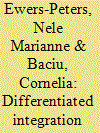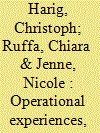|
|
|
Sort Order |
|
|
|
Items / Page
|
|
|
|
|
|
|
| Srl | Item |
| 1 |
ID:
187306


|
|
|
|
|
| Summary/Abstract |
An extensive size of literature has investigated the multifaceted dimensions of differentiated integration in Europe. Notwithstanding, we know little about the drivers and strategic underpinnings of differentiated integration in the high politics areas concerning national and international security, such as foreign policy, security and defence. What explains the variation in states’ foreign policy preferences of integration in multilateral security orders? In this article, we seek to explain this variation by putting forward a two-level argument. First, we claim that states adopt a genuine role player conception underpinned by a mixture of relative gains, absolute gains, and normative factors. Second, we propose a novel operational model to examine member states’ efforts for cooperation and integration in the security and defence domain based on their threat perceptions, level of ambitions, strategic partnerships, military spending, and troop deployments. To illustrate our argument, we employ a comparative case study design, examining four countries: Germany, France, Ireland and Romania. The article finds that the analysed countries play conspicuous roles in the Euro-Atlantic security order. France takes the role of an agile power-projector, Germany embraces the role of a global responsibility taker, Ireland plays the role of a peacekeeping neutral, and Romania of a small regional power.
|
|
|
|
|
|
|
|
|
|
|
|
|
|
|
|
| 2 |
ID:
183894


|
|
|
|
|
| Summary/Abstract |
Academic research on civil-military relations often assumes that dangers for democracy and civilian control mainly emanate from the military's predisposition of ‘pushing’ its way into politics. Yet, civilian control frequently is a precondition for governments’ moves of ‘pulling’ the military into roles that may potentially be problematic. These can include the military's involvement in political disputes or internal public security missions. Notwithstanding its empirical relevance, little academic work has been devoted to understanding how ‘pulling’ works. In this article, we aim to provide a first, exploratory framework of ‘pulling’ that captures the dynamics of the military's reactions and indirect consequences for civil-military relations. We identify three analytically distinct phases in which pulling occurs. First, politicians initiate either operational or political pulling moves. Second, we situate the military's reaction on a spectrum that ranges from refusal to non-conditional compliance. This reaction is driven by the military's role conceptions about appropriate missions and their relation to politics. In a third phase, the military may slowly start shifting its role conceptions to adapt to its new roles. We illustrate our argument with case studies of two different instances of pulling: operational pulling in the case of France (2015–19) and operational – then-turned-political – pulling in the case of Brazil (2010–20).
|
|
|
|
|
|
|
|
|
|
|
|
|
|
|
|
| 3 |
ID:
183890


|
|
|
|
|
| Summary/Abstract |
A considerable amount of research within security studies has explored the military's increasingly diverse and multifaceted tasks. However, this debate has been disconnected from the literature on civil-military relations to the effect that we still lack knowledge about how and why these operational tasks have consequences for the relations between the armed forces, civilian authorities, and society at large. In order to provide for a better understanding of these effects, this introduction to the Special Issue debates the concept of operational experiences to capture how the military's routine activities affect the equilibria, logics, and mechanisms of civil-military relations. The article then provides an overview of the Special Issue's six contributions, whose diverse and global perspectives shed light on different aspects of the relationship between military missions and the military's roles in society and politics. Among other factors, they highlight role conceptions – the military's shared views on the purpose of the institution – as crucial in shaping the dynamic relation between what the military does and what place it occupies within the state and society. The article concludes by describing potentially fruitful areas of future research.
|
|
|
|
|
|
|
|
|
|
|
|
|
|
|
|
| 4 |
ID:
158729


|
|
|
|
|
| Summary/Abstract |
The dawn of the twenty-first century witnessed a new wave of multilateral initiatives in the Asia-Pacific. By integrating institutional balancing theory and role theory, the author proposes a new theoretical framework—‘balance of roles’—to explain the variations in institutional strategies by different states. It is argued that a state’s role conception will shape its institutional balancing strategies in an order transition period. An order defender, like the USA, is more likely to adopt exclusive institutional balancing to exclude its target from its dominated institutions. An order challenger, such as China, will choose both inclusive and exclusive institutional balancing to maximise its own power and legitimacy in a new international order. As a kingmaker, a proactive second-tier state is more likely to pick an inter-institutional balancing strategy to initiate new institutions for competing for influence with existing institutions. An institutionalised order transition might be more peaceful than widely perceived.
|
|
|
|
|
|
|
|
|
|
|
|
|
|
|
|
| 5 |
ID:
181638


|
|
|
|
|
| Summary/Abstract |
The large number of asylum seekers dying off the coast of Libya has turned the Southern Mediterranean Sea into a new humanitarian space, prompting 11 non-governmental organisations (NGOs) to launch maritime Search and Rescue (SAR) operations between 2014 and 2017. These NGOs engaged in a complex web of interactions, ranging from rare instances of hostility, competition and mistrust to coordination, cooperation and integration. Drawing on role theory, I argue that organisational role conceptions are key to shaping NGO–NGO interactions. The humanitarian principles of neutrality, impartiality and independence serve as action scripts that inform NGOs’ role in the humanitarian space. Sea rescue NGOs have upheld different interpretations of humanitarian principles, developing supportive, neutral, or confrontational approaches vis-à-vis European governments’ border control policies. By leveraging content analysis and semi-structured interviews, I show that organisations with matching role conceptions have engaged in tighter forms of cooperation; charities with divergent role conceptions, by contrast, have shown a tendency to develop mistrust and engage in more competitive interactions. These frictions inhibited NGOs from forming a united front vis-à-vis policy restrictions and criminalisation, hindering the legitimacy and viability of non-governmental sea rescue.
|
|
|
|
|
|
|
|
|
|
|
|
|
|
|
|
|
|
|
|
|